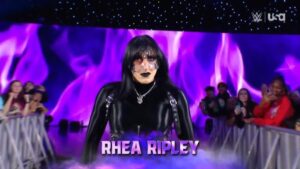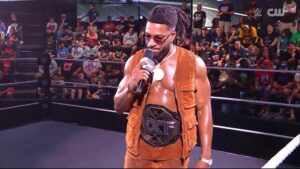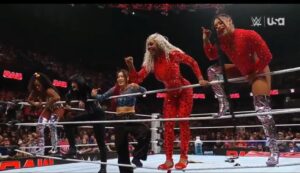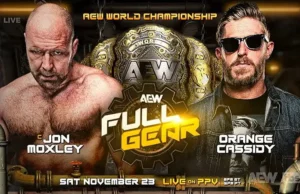First off, let’s clear the elephant in the room. This is in no way reflective of Michael Hutter, the man who has portrayed Ethan Carter III (EC3) on Impact Wrestling for the past five years in contrast to the man that is ultimately Bret Hart behind the Hitman. This is strictly based on the character’s value to the company and how his character faced a similar demise in the company they worked for.
At last night’s Impact tapings, EC3 won one of the briefcases in the returning Feast or Fired gimmick match, and ultimately drew the briefcase that contained the pink slip, leading to EC3’s termination with Impact Wrestling. He joins a list that has included Low Ki, Velvet Sky, Curry Man, Grado, Shawn Daivari and a completely unaware Chavo Guerrero Jr. as performers who were written out of Impact’s storylines due to ending contracts or departures. While his contract was set to expire this summer, according to PWInsider, EC3 was granted an early release and is finishing up with the company following these tapings.
EC3 takes a final bow #ImpactWrestling pic.twitter.com/tc4Qkjtan3
— Impact Wrestling Orlando (@ImpactOrlando) January 14, 2018
Ethan Carter III’s rise in Impact and what he did for the company, right up to his final departure, is eerily similar to the role that Bret ‘Hitman’ Hart portrayed for the WWF during the New Generation Era (1993-1997). From his elevation to the main level due to his clockwork performances, to carrying a promotion that was fighting to stay afloat and relevant, up to his departure as the company made its next transition of eras, EC3 has become the Bret Hart of Impact’s legacy the past decade.
Ethan Carter III: The Bret Hart of Impact Wrestling
In 1993, the WWF was facing its toughest challenge since Vince McMahon Jr. took over the promotion in 1982 a decade earlier. Times had changed and the WWF was sinking faster than it could tread water. Fans, now influenced by the raw reality of the ages, as influenced by the rise of emotionally charged grunge music over highly produced pop music, had turned their back on the 80s cartoon character gimmicks of the Rock N’ Wrestling Era. The steroid scandal that began in 1991 had begun to sour fans on the cookie cutter bodybuilder types, and the influx of tape trading from New Japan had begun to put a greater emphasis on ring work than just saying your prayers and eating your vitamins. It was this shift in attitudes – as well as WCW’s slow poaching of WWE main event stars like Hulk Hogan, “Macho Man” Randy Savage, and others – that lead to the rise of smaller stars, like Mr. Perfect, Shawn Michaels and Bret ‘Hitman’ Hart.

Bret Hart started 1993 as WWF World Heavyweight Champion, but it had been hell in getting the title. He had won his first World title at a WWF House Show in Saskatoon, because Ric Flair wasn’t willing to drop it to the more inexperienced Hart at a PPV. He dropped his belt to Yokozuna at WrestleMania IX only for a returning Hulk Hogan to reclaim it minutes later. When Hogan was asked to pass the torch to the emerging Hitman, Hogan balked and walked out on the WWF instead (he would sit out his contract and jump to WCW months later), dropping the belt to Yokozuna so he could do the job for Hart instead. But the small (by WWF standards) and technically sound Bret Hart became one of the most beloved and popular WWE World Champions of all time, leading the way with beautifully crafted matches, technical prowess and ring psychology that elevated everyone in the ring with him, from his younger brother Owen Hart to helping create the phenomenon of “Stone Cold” Steve Austin at WrestleMania 13. With Hart as the face of the company from 1993 through 1996, the WWF limped out of the spiralling disaster of the steroid scandal end of the Rock N’ Wrestling Era and began to start treading water again. It was still in financial trouble, but at least the blood letting had stopped.

Michael Hutter found himself in a similar situation when he arrived in TNA in 2013. Hutter had just come off a sideways run with WWE’s NXT as Derrick Bateman. He’s also worked WWE’s developmental in Florida Championship Wrestling (FCW) prior (where he won FCW Tag Team gold with Fandango), but with a new energy in NXT, people expected Bateman to become one of it’s early stars. He routinely partnered with a pre-Tyler Breeze Mike Dalton, or faced off against current WWE Superstars like Dean Ambrose, Jinder Mahal, Cesaro, Fandango, and Heath Slater. But in May 2013, he wrestled his last NXT match against Big E and was ultimately released from the WWE. He made his Impact televised debut at TNA Bound For Glory ’13, in a squash match against California indie veteran Peter Avalon (as Norv Fernum), repackaged as Ethan Carter III, the spoiled rich kid nephew of TNA President and Owner, Dixie Carter. He was instantly despised. But while Bret Hart emerged as the early beacon of hope for the New Generation of the WWF, EC3 began as a token symbol of what many fans perceived as the growing problem with Impact Wrestling – the Carter family’s mismanagement of the brand. But through his charismatic heel work, passion and solid ring work, he began to appeal to the fans in the Impact Zone. He would become a 2x Impact World Heavyweight Champion, and like Hart in the New Generation Era, one of the bright spots during an era where the promotion was struggling to find it’s identity in a world of changing tastes. Under Dixie Carter’s last final years, Impact was on the verge of bankruptcy more often than not, with rumblings of missed paychecks running on dirt sheets with increasing frequency. But EC3 kept the fans tuning in and he remained one of the shining examples of a reason to watch Impact Wrestling.

As Bret Hart entered 1997, the landscape had shifted. The WWF’s 80s competition, the NWA, had rebounded and become WCW and was now beating the WWF at it’s own game. It was winning the wars on television and on the PPV circuit, and it was poaching Vince’s top stars (and brands) with the same fervor as Vince had done to the NWA and other territories in the 80s. While Bret had been holding the fort in the main event for the past four years, the WWF had been building it’s undercard with cast offs and homegrown stars, like “Stone Cold” Steve Austin, Hunter Hearst Helmsley, Rocky Maivia, Mankind and more. As the new breed began to start showing this new attitude, it became apparent that Bret Hart was a symbol of yet a different time. Hart’s character fittingly acknowledged all of this, turning heel for the first time since his devious ways with Jim Neidhart and Jimmy Hart in the villainous original Hart Foundation tag team. With a new Hart Foundation stable under his wing, Hart would produce arguably one of his finest angles in his career. But it was a career that was about to hit a crossroads. Bret Hart’s new Hart Foundation climactically lost their fight for decency in pro wrestling, ending with the ultimate exclamation point with the Montreal Screwjob. Hart’s contract was up, he was not re-signing with the WWF, and he was heading on to new pastures in his career. With the departure of a large part of WWF’s main event picture (and the departure of his arch-rival Shawn Michaels less than a year later due to injury), it opened up the heavens for a new wave of stars to grasp that brass ring, giving us “Stone Cold”, The Rock and Triple H to name a few. Hart’s departure allowed the WWE to breath in some new direction and life and thus the Attitude Era save the WWE as we know it.

As EC3 entered 2018, the landscape had shifted. Impact Wrestling, once the number two competition behind the WWE in everything from fan opinion to sheer financial numbers, was in a fight. Other US indies like Ring of Honor had surpassed Impact in public opinion as the countries number two, and interest in other international promotions, like NJPW, PROGRESS and others, had offered far more options to the WWE than just Impact Wrestling. He’d seen management shift three times since his “aunt” lost control of the company in late 2016, first to rockstar Billy Corgan, then to Anthem Entertainment under Jeff Jarrett‘s direction, and finally in the past few weeks with the naming of Scott D’Amore and Don Callis as the new creative Executive Committee. The roster was shifting and morphing – gone where the names that surrounded EC3, like The Broken Hardys, AJ Styles, “Cowboy” James Storm, Drew Galloway, Bully Ray, Kurt Angle, replaced by a new generation of Impact stars, like Johnny Impact, Sami Callihan, Dezmond Xavier, Brian Cage, Alberto El Patron. While surely there could be still be a spot for EC3 in the new direction – much like how WWF could have found a spot for Bret Hart – it wouldn’t be the spot that either the wrestler nor the fans would ever truly embrace. Carter’s contract was up, he is not re-signing with Impact, and he is heading on to new pastures in his career. And EC3’s departure will allow Impact room to breath in some new direction and life and enter a new era for Impact Wrestling that is needed in order to turn that corner in their history.

Sadly, Bret Hart’s career took a turn for the worse. Grossly misused in WCW during his hottest value years (directly after the Screwjob), and then retired from an errant kick from Goldberg, Hart has spent the past twenty years answering the same questions about the same three topics: the Screwjob, his brother Owen’s death, and his misuse by WCW. It’s no wonder he’s miserable – you would be too if all anyone asked you about were the worst three things of your career. But Bret Hart was 40 years old when he arrived in WCW from WWF – he was in the twilight of his career. He could have had a smoother final chapter of his legacy, but his legacy was already cemented before he ever got screwed in Montreal.

EC3 is only 34 years old. He is in the prime of his career as far as professional wrestling goes. He’s a smarter wrestler than Derrick Bateman was. He’s a wiser man than Mike Hutton was. And he’s managed to maintain a presence on the indie circuit outside of Impact Wrestling, including EVOLVE, House of Hardcore, WrestleCircus, House of Glory, AIW, and IPW:UK. While many are quick to assume he’ll return to the WWE Universe (and most likely NXT), there are other options. While he wouldn’t be the draw that Cody Rhodes was following his WWE departure in 2016, he would still do very, very well should he decide to do an independent tour, working with promotions like PWG, AAW and the like. He’s recently trademarked EC3 for himself, in compliance with Impact’s new business model of allowing wrestlers to keep their intellectual properties when they leave, so he could move to Ring of Honor quite easily and maintain his EC3 gimmick. And a move to ROH would be a far greater opportunity to further expand on what he’s already built for his brand – chances are he’d return to Derrick Bateman in NXT (like Chris Hero returned to Kassius Ohno) and have to go through the entire rebuilding process again. And a rebuilding process is exactly why he’s leaving Impact Wrestling in the first place.
Ethan Carter III was just the character Impact Wrestling needed in its darkest times. Just like Bret Hart was the light for the WWF during its own. But Impact has changed and now’s the perfect time for EC3 to leave with his head high, as a former 2x World Champion, with nothing but the future and opportunity awaiting him.







